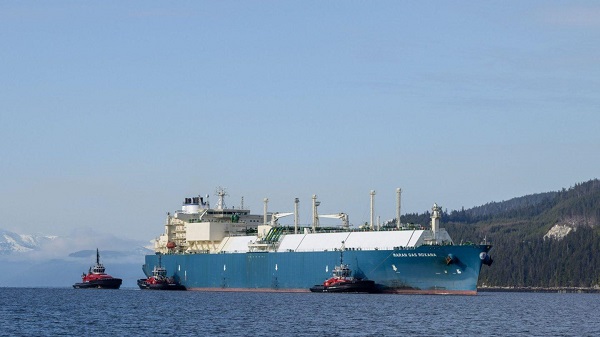Alberta
As LNG opens new markets for Canadian natural gas, reliance on U.S. to decline: analyst

From The Canadian Energy Centre
By Cody Ciona
Starting with LNG Canada, producers will finally have access to new customers overseas
Canada’s natural gas production and exports are primed for growth as LNG projects come online, according to Houston, Texas-based consultancy RBN Energy.
Long-awaited LNG export terminals will open the door to Asian markets and break the decades-long grip of the United States as the sole customer for Canada’s natural gas.
RBN projects that Canada’s natural gas exports will rise to 12 billion cubic feet per day (bcf/d) by 2034, up from about 8 bcf/d today. But as more LNG terminals come online, less of that natural gas will head south.
“We think the real possibility exists that the amount of natural gas being exported to the United States by pipeline will actually decline,” said Martin King, RBN’s managing director of North America energy market analysis, on a recent webinar.
RBN’s analysis suggests that Canada’s natural gas exports to the United States could drop to 6 bcf/d by the early 2030s compared to around 8 bcf/d today.
With the first cargo from the LNG Canada terminal at Kitimat, B.C. expected to ship in late June, Canada will finally have access to new markets for natural gas. The first phase of the project will have capacity to ship about 1.8 bcf/d.
And more projects are on the way.
LNG Canada’s joint venture partners are considering a second phase that would double export capacity.
Also at Kitimat, the Cedar LNG project is under construction and is expected to be completed in 2028. The floating terminal led by the Haisla Nation will have capacity to export 0.4 bcf/d.
Woodfibre LNG, located near Squamish, B.C. began construction in late 2023 and is expected to be substantially completed by 2027, with export capacity of about 0.3 bcf/d.
Expansions of LNG Canada and Cedar LNG could put LNG exports into the range of 5 bcf/d in the early 2030s, King said.
Alberta
New pipeline from Alberta would benefit all Canadians—despite claims from B.C. premier

From the Fraser Institute
The pending Memorandum of Understanding between the Carney government and the Alberta governments will reportedly support a new oil pipeline from Alberta’s oilsands to British Columbia’s tidewater. But B.C. Premier David Eby continues his increasingly strident—and factually challenged—opposition to the whole idea.
Eby’s arguments against a new pipeline are simply illogical and technically incorrect.
First, he argues that any pipeline would pose unmitigated risks to B.C.’s coastal environment, but this is wrong for several reasons. The history of oil transport off of Canada’s coasts is one of incredible safety, whether of Canadian or foreign origin, long predating federal Bill C-48’s tanker ban. New pipelines and additional transport of oil from (and along) B.C. coastal waters is likely very low environmental risk. In the meantime, a regular stream of oil tankers and large fuel-capacity ships have been cruising up and down the B.C. coast between Alaska and U.S. west coast ports for decades with great safety records.
Next, Eby argues that B.C.’s First Nations people oppose any such pipeline and will torpedo energy projects in B.C. But in reality, based on the history of the recently completed Trans Mountain Expansion (TMX) pipeline, First Nations opposition is quite contingent. The TMX project had signed 43 mutual benefit/participation agreements with Indigenous groups along its route by 2018, 33 of which were in B.C. As of March 2023, the project had signed agreements with 81 out of 129 Indigenous community groups along the route worth $657 million, and the project had resulted in more than $4.8 billion in contracts with Indigenous businesses.
Back in 2019, another proposed energy project garnered serious interest among First Nations groups. The First Nations-proposed Eagle Spirit Energy Corridor, aimed to connect Alberta’s oilpatch to a port in Kitimat, B.C. (and ultimately overseas markets) had the buy-in of 35 First Nations groups along the proposed corridor, with equity-sharing agreements floated with 400 others. Energy Spirit, unfortunately, died in regulatory strangulation in the Trudeau government’s revised environmental assessment process, and with the passage of the B.C. tanker ban.
Premier Eby is perfectly free to opine and oppose the very thought of oil pipelines crossing B.C. But the Supreme Court of Canada has already ruled in a case about the TMX pipeline that B.C. does not have the authority to block infrastructure of national importance such as pipelines.
And it’s unreasonable and corrosive to public policy in Canada for leading government figures to adopt positions on important elements of public policy that are simply false, in blatant contradiction to recorded history and fact. Fact—if the energy industry is allowed to move oil reserves to markets other than the United States, this would be in the economic interest of all Canadians including those in B.C.
It must be repeated. Premier Eby’s objections to another Alberta pipeline are rooted in fallacy, not fact, and should be discounted by the federal government as it plans an agreement that would enable a project of national importance.
Alberta
Premier Danielle Smith says attacks on Alberta’s pro-family laws ‘show we’ve succeeded in a lot of ways’

From LifeSiteNews
Recent legislation to dial back ‘woke progressivism’ is intended to protect the rights of parents and children despite opposition from the left.
Alberta Premier Danielle Smith took a shot at “woke progressivism” and detractors of her recent pro-family laws, noting that because wokeness went “too far,” the “dial” has turned in favor of parental rights and “no one” wants their “kid to transition behind their back.”
“We know that things went a little bit too far with woke progressivism on so many fronts and we’re trying to get back to the center, trying to get them back to the middle,” Smith said in a recent video message posted on the ruling United Conservative Party’s (UCP) official X account.
Smith, who has been battling the leftist opposition New Democratic Party (NDP) attacks on her recent pro-family legislation, noted how “we’ve succeeded in a lot of ways.”
“I think we have moved the dial on protecting children and the right of girls and women to participate in sports without having to face born male athletes,” mentioning that the Olympics just announced gender-confused athletes are not allowed to compete in male or female categories.
“I think we’re moving the dial on parental rights to make sure that they know what’s going on with their kids. No one wants their kid to be transitioned behind their back and not know. I mean, it doesn’t matter what your background is, you want to know what’s going on with your child.”
Smith also highlighted how conservatives have “changed the entire energy conversation in the country, we now have we now have more than 70 percent of Canadians saying they believe we should build pipelines, and that we should be an energy superpower.’
As reported by LifeSiteNews, Smith recently said her government will use a rare constitutional tool, the notwithstanding clause, to ensure three bills passed this year – a ban on transgender surgery for minors, stopping men from competing in women’s sports, and protecting kids from extreme aspects of the LGBT agenda – remain law after legal attacks from extremist activists.
Bill 26 was passed in December 2024, amending the Health Act to “prohibit regulated health professionals from performing sex reassignment surgeries on minors.”
Last year, Smith’s government also passed Bill 27, a law banning schools from hiding a child’s pronoun changes at school that will help protect kids from the extreme aspects of the LGBT agenda.
Bill 27 will also empower the education minister to, in effect, stop the spread of extreme forms of pro-LGBT ideology or anything else allowed to be taught in schools via third parties.
Bill 29, which became law last December, bans gender-confused men from competing in women’s sports, the first legislation of its kind in Canada. The law applies to all school boards, universities, and provincial sports organizations.
Alberta’s notwithstanding clause is like all other provinces’ clauses and was a condition Alberta agreed to before it signed onto the nation’s 1982 constitution.
-

 International2 days ago
International2 days agoBoris Johnson Urges Ukraine to Continue War
-

 Business23 hours ago
Business23 hours agoFederal major projects list raises questions
-

 Health1 day ago
Health1 day agoOrgan donation industry’s redefinitions of death threaten living people
-

 Great Reset2 days ago
Great Reset2 days agoRCMP veterans’ group promotes euthanasia presentation to members
-

 Daily Caller2 days ago
Daily Caller2 days agoEXCLUSIVE: Here’s An Inside Look At The UN’s Disastrous Climate Conference
-

 Artificial Intelligence1 day ago
Artificial Intelligence1 day agoGoogle denies scanning users’ email and attachments with its AI software
-

 Business2 days ago
Business2 days agoTaxpayers paying wages and benefits for 30% of all jobs created over the last 10 years
-

 Business2 days ago
Business2 days agoIs affirming existing, approved projects truly the best we can do in Canada?









